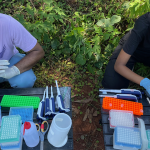Oceans
- November 16, 2021
- Sarah Elizabeth Anderson
“Tropical glacier” — the term sounds like an oxymoron and, due to climate change, it might become one. These bodies of ice nestle in the
- December 18, 2020
- Shivani Majmudar
COVID-19 swept the world, with little regard for anyone who stood in its path. Within weeks, the virus killed thousands, isolated people in their homes
- December 18, 2020
- Shivani Majmudar
Amid this year’s global pandemic, the world is also fighting more frequent and severe hurricanes, larger wildfires and prolonged heat waves—indicative that climate change is
- December 18, 2020
- Marisa Sloan
Despite the sci-fi name of this rare-earth element, neodymium is actually pretty common. The silvery metal is used in everything from cell phones and wind
- December 26, 2019
- zfishman
The locked office of the late climate scientist Wallace “Wally” Broecker displays a wooden ship’s wheel, mounted on a window-paneled wall behind his former desk.
- December 20, 2019
- ebruess
I ziplined recently with a scientist who told me that her work involved almost 4,000 floating robots and a massive global computer database that could
- December 19, 2019
- asnabes
Calcium carbonate, a primary ingredient in the shells of tiny marine organisms, reduces the acidification of our world’s oceans. The ocean is approximately 30% more
- November 20, 2019
- zfishman
Dozens of scientists convene every year at the Comer Climate Conference to share new research about rising oceans and melting glaciers, both today and in
- October 29, 2019
- zfishman
Richard Alley caught a cold while flying to southwest Wisconsin for the annual Comer Climate Conference land, hosted each fall by the Comer Family Foundation.
- December 20, 2018
- hmagnuson
Tiny bubbles of gas trapped in glacial ice are giving scientists clues about Earth’s sea level 125,000 years ago. The gas bubbles serve as bite-sized
Categories
Latest Articles
February 15, 2026
Contact Information
Abigail Foerstner, Managing Editor and Medill Associate Professor




